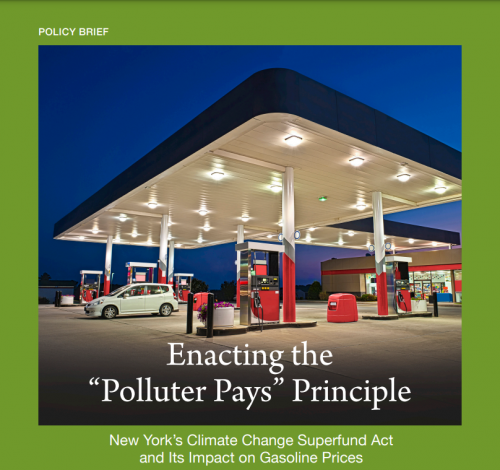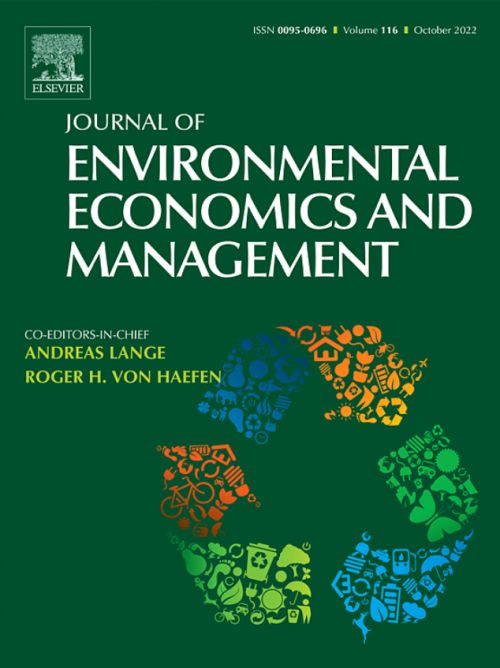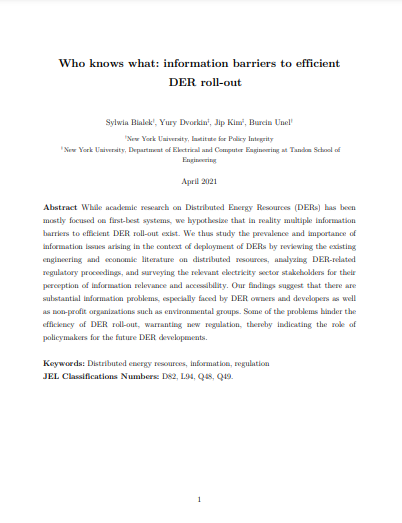-

Enacting the “Polluter Pays” Principle
New York’s Climate Change Superfund Act and Its Impact on Gasoline Prices
This policy brief analyzes how New York State’s recently proposed Climate Change Superfund Act is most likely to affect consumer gasoline prices. The Act would require payments from fossil-fuel companies based on their historical contributions to current greenhouse gas levels in the atmosphere. The payments would be used to build green infrastructure to help the state adapt to climate change. The brief finds that the Act would likely have a negligible impact on current and near-term oil prices, while potentially lowering future energy prices in New York, including for transportation.
-
Comments to FTC on Commercial Surveillance and Data Security
In August, the Federal Trade Commission released an advance notice of proposed rulemaking seeking comment on avenues to regulate commercial surveillance and data security practices that harm consumers. Policy Integrity submitted comments recommending that the FTC regulate “immortal accounts,” a practice by which entities make it difficult or impossible to delete a consumer account in order to retain and profit from the user’s data and continue charging subscriptions. Our comments were based on a report that we recently published establishing the Commission’s authority to regulate this pervasive practice.
-

Do Non-Damaging Earthquakes Shake Mortgage Lenders’ Risk Perception?
Working paper in Journal of Environmental Economics and Management
This study examines how banks respond to earthquakes that convey seismic risk salience but do not cause damage, i.e., noticeable non-damaging earthquakes (NNDEs). Using evidence from California, we find loans more likely to be denied or sold after increased NNDEs. Banks with fewer assets, more diversified branching markets, or stronger sales capability relied more on securitization to transfer the perceived seismic risk. We show evidence that banks likely learned about the NNDEs through personal experience and local news. The effects of NNDEs persisted up to three years. Meanwhile, the NNDEs only caused moderate and temporary collateral devaluation but did not increase the observable default risk. Thus, banks' responses most likely resulted from the increased risk salience of future damaging earthquakes during the mortgage term. Our findings call for reevaluations of the heuristics in banks' risk-perception updating and have implications for designing more efficient disaster risk-sharing mechanisms in the financial market.
-
Comments on BSEE Well Control Rule
Policy Integrity submitted comments to the Bureau of Safety and Environmental Enforcement (BSEE), located within the Department of the Interior, in support of its proposed rule to strengthen regulations for well control and blowout preventer systems in the Outer Continental Shelf. This rule aims to reduce the risk of loss-of-well-control events, such as the Deepwater Horizon oil spill, by tightening well operator reporting requirements and equipment standards. Our comments encourage BSEE to strengthen the Proposed Rule's cost-benefit analysis by performing a break-even analysis and quantitatively assessing and/or qualitatively describing the full range of harms that result from well blowouts.
-
Who Knows What: Information Barriers to Efficient DER Roll-Out
Published in International Association of Energy, Environment and Economy Journal
While academic research on Distributed Energy Resources (DERs) has been mostly focused on first-best systems, we hypothesize that in reality multiple information barriers to efficient DER roll-out exist. We thus study the prevalence and importance of information issues arising in the context of deployment of DERs by reviewing the existing engineering and economic literature on distributed resources, analyzing DER-related regulatory proceedings, and surveying the relevant electricity sector stakeholders for their perception of information relevance and accessibility.
-
Policy Integrity Research Shapes New Federal Climate Damage Estimates
In its updated climate damage estimates for greenhouse gas emisisons, the Environmental Protection Agency (EPA) cited Policy Integrity scholarship and analysis dozens of times and adopted some of our key arguments. EPA calculated damages based on averaging three damage functions, one of which was based on a paper by Peter Howard and Thomas Sterner. In setting the scope of damages to examine, the agency also adopted Policy Integrity's argument for the need to consider global damages. EPA similarly relied on our arguments about the need to use lower discount rates when assessing the value of future damages.
-
Comments on HHS Streamlining Rule
Policy Integrity submitted comments to the Centers for Medicare & Medicaid Services (CMS) in support of its proposed rule to streamline applications and eligibility determinations for Medicaid, the Children's Health Insurance Program, and the Basic Health Program. Our comments encourage CMS to strengthen the Proposed Rule's cost-benefit analysis by describing the many health and economic benefits that result from increased access to healthcare and engaging in a more robust distributional analysis.
-
SC-GHG Comments on DOE Standards for Microwave Ovens
We submitted joint comments to the Department of Energy (DOE) on its proposed rule to strengthen energy conservation standards for microwave ovens. Our comments applaud the agency for appropriately applying the social cost of greenhouse gases to estimate the climate benefits of the proposed standards, even though the standards would be cost-benefit justified without considering any climate benefits. We also expand upon DOE's justifications for adopting a global damages valuation and for the range of discount rates it applies to climate effects.
-
Comments to DOE on Clean Hydrogen Production Standard
The Department of Energy (DOE) solicited comments on its draft guidance for the Clean Hydrogen Production Standard, a target that will be selected by DOE for the carbon intensity of clean hydrogen. This standard relates to DOE’s implementation of the hydrogen-hub provision of the Bipartisan Infrastructure Law. Policy Integrity and WattTime submitted comments to DOE on how to accurately measure the carbon emissions from using grid electricity to produce hydrogen. In particular, we suggested the use of a marginal-emissions approach instead of an annual-average approach. We also recommended that DOE adhere to rigorous carbon-accounting principles if hydrogen producers want to use market instruments like renewable energy credits or power-purchase agreements to characterize the carbon intensity of hydrogen produced using grid electricity.
-
Comments to Treasury and IRS on IRA Implementation
Following the passage of the Inflation Reduction Act, the Department of Treasury and the Internal Revenue Service issued a series of Requests for Information seeking comments and suggestions on implementing the tax benefits contained in the historic climate law. Building on Policy Integrity's deep expertise in incorporating equity into the rulemaking process, we submitted general comments advising Treasury and IRS to:
- coordinate with other federal agencies with experience incorporating environmental justice and equity into their rulemaking process; and
- conduct robust stakeholder outreach throughout the guidance and rulemaking process, especially in disadvantaged communities.
In addition, Policy Integrity included specific recommendations with respect to the calculation of carbon intensity for hydrogen production based on recent comments to the Department of Energy.








